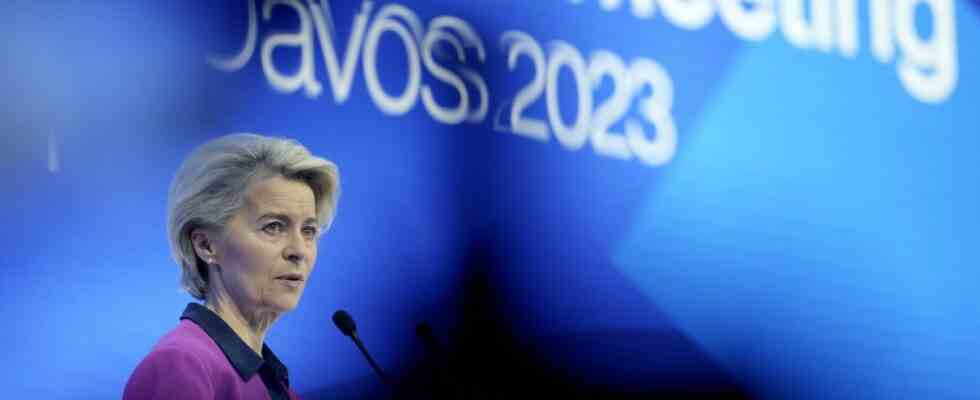We can only do it together: together for Ukraine, together against the energy crisis, together for the climate. In her opening speech at the World Economic Forum in Davos, the President of the European Commission, Ursula von der Leyen, made a strong appeal for solidarity and against geopolitical demarcation; that meeting of the important and powerful, in which the first few hours are primarily about the multiple crises that the world is currently confronted with. And the question: Is the world drifting apart?
Von der Leyen had every reason to give in to this impression. It is in the midst of a trade debate that has the potential to grow into a full-fledged trade dispute. The so-called Inflation Reduction Act (IRA) of US President Joe Biden, who is to accelerate the conversion of the American economy to green technologies with 369 billion dollars, is forcing them to also negotiate faster and higher subsidies for EU companies. Because even if Biden’s package is actually a long overdue step in American climate policy, there is an explosive side effect. Or as von der Leyen puts it: It is “no secret that certain elements of the Inflation Reduction Act have raised concerns about some of the targeted stimulus to companies”.
What she means by that is the discrimination against European corporations that comes with supporting US corporations manufacturing in the United States. Especially those companies that do a lot of trade with America could relocate investments and even entire plants to the United States. At least that’s what the EU Commission fears.
“Easier Calculations. Simpler Procedures. Faster Approvals”
According to von der Leyen, in future the governments of the EU countries should be able to pay more subsidies to companies that invest in green technologies. The EU Commission’s strict subsidy rules are to be relaxed, at least for a limited period of time. “Simple calculations. Simpler procedures. Faster approvals,” says von der Leyen. Europe has a plan for the future. “And that’s why I believe that the history of the clean technology economy will be written in Europe.”
In addition, she has now announced a new “net zero industry law” in Davos, with which she wants to make Europe’s economy the world market leader for clean technologies and innovations. It would set clear targets for clean technologies in Europe by 2030. The plan envisages simplifying rules to create more favorable conditions for suppliers of products such as wind energy, heat pumps, solar energy and clean hydrogen. The declared goal is to invest in strategic projects along the entire supply chain. “Those who develop and manufacture the technologies that underpin tomorrow’s economy will have the greatest competitive advantage,” says the Commission President.
This shows that both von der Leyen and Biden are no longer only concerned with the climate with their subsidy program. It is also and above all about competition. Both politicians want to make the EU and the USA more independent of other countries – especially China – and accelerate the development of crucial supply chains. For example for electromobility. At the same time, both hope that new investments will also bring new jobs.
If the subsidy race intensifies, it will hardly help anyone
So how great is the risk of triggering a real subsidy race on both sides with subsidies? Von der Leyen admits that competition is increasing. But she is convinced that this competition, like trade, is “the turbo for clean technologies and climate neutrality”. She therefore calls for the respective incentive programs to be fair and mutually reinforcing.
And while on the first day of the World Economic Forum everyone was discussing whether the world is on the way to an era of de-globalization or re-globalization, von der Leyen is clearly positioning itself here as well. “As a result of accelerated change, our economies will be increasingly dependent on international trade,” says the President of the Commission. International trade is the key to reducing industry costs, creating jobs and developing new products.
Von der Leyen also clearly rejects decoupling from China. Especially with regard to the green transition, one must “continue to work with China and trade,” says von der Leyen. At the same time – and this can certainly be taken as a warning – more action will be taken against unfair trade. China, for example, has openly encouraged EU companies to relocate their production there, “with the promise of cheap energy, lower labor costs and a more relaxed regulatory environment”. The EU will use all instruments to take action against unfair practices, says von der Leyen. And it signals that the fight for supremacy in green energies is in full swing – but it has not yet been decided whether it will be fought with or against each other.

